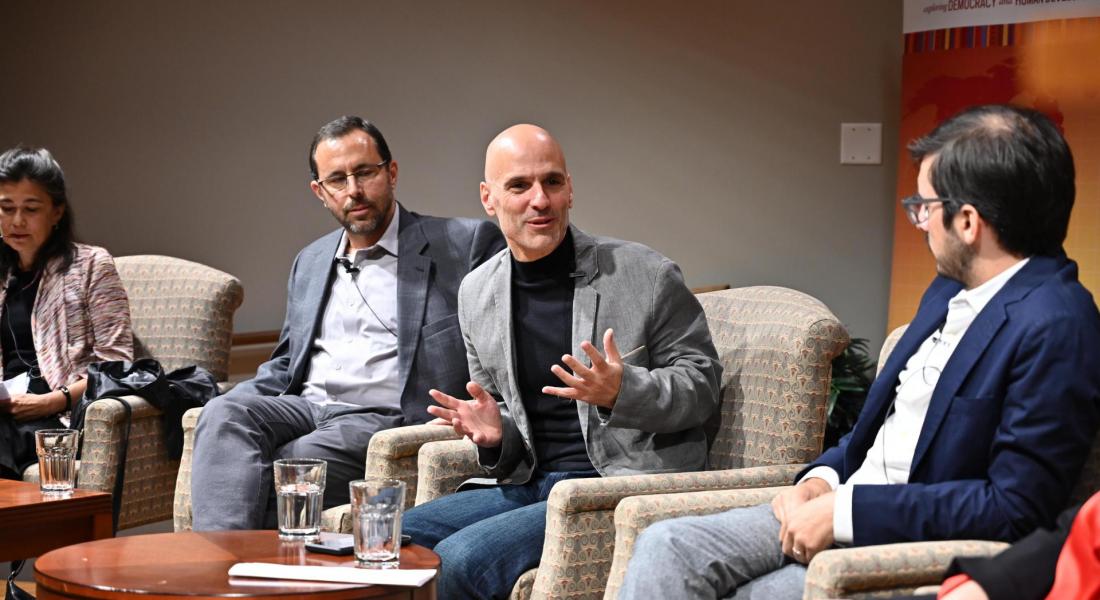
With its history of authoritarianism and rocky transitions to democracy, Latin America has plenty to teach the rest of the world – including Western countries facing serious challenges to their own democracies, according to a group of Kellogg Institute for International Studies faculty fellows who recently joined the university faculty.
“We have observed the erosion of democracy in multiple countries recently,” said Aníbal Pérez Liñán, a professor of political science and global affairs at the Keough School of Global Affairs. Today, the problems Latin America faced decades ago are “something we’re seeing emerge in other parts of the world, sometimes in advanced countries where you would not expect to see those problems.”
Pérez Liñán was one of four panelists who spoke at a public talk October 4 on “Addressing Global Challenges: Lessons from Latin America” as part of the Institute’s two-day annual Advisory Board gathering. According to Director Paolo Carozza, the event highlighted the Institute’s traditional focus on Latin America and provided background for the Advisory Board as it evaluated the Institute’s long-term goals.
The event was moderated by Advisory Board members Wendy Hunter, a former visiting fellow who teaches government at the University of Texas at Austin, and Faculty Fellow Rev. Timothy Scully, CSC (political science).
Panelists, all new faculty fellows at the Institute, discussed political issues in Latin America including extreme partisanship, and at times drew parallels between the region and the rest of the world.
Several pointed to Venezuela as an example of a democracy in decline.
“It’s a clear case of (political) polarization leading to democratic erosion,” said Luis Schiumerini, an assistant professor of political science.
Pérez Liñán blamed Venezuela’s downward spiral on elected leaders who enacted policies triggering “the destruction of democracy from inside.”
“The next wave of authoritarianism will emerge from leaders that undermine democracy,” he predicted.
Panelists said studying the region, with its diversity of societies and political experiences, helps them understand factors that promote democracy and development.
Schiumerini noted that, in general, Latin America isn’t as underdeveloped as Africa or as developed as Europe or the United States.
“In that sense, Latin America provides really interesting insights in areas where democracy is consolidated but the rule of law has gaps,” he said.
Tom Mustillo, an associate professor of global affairs at the Keough School, noted that many Latin American states, such as Ecuador, are still operating with “inchoate” party systems years after a third wave of democracy swept the region. His research addresses how those systems change.
“That suggests there’s no natural evolution or progression or process playing out here. You can persist in that state for a pretty long time.”
Tamara Kay, an associate professor of sociology and global affairs at the Keough School who studies international trade pacts, said Mexico’s experience with international trade agreements spurred successful social activism on labor issues.
“Latin America is just an incredible place to think about the causes and consequences of social change, especially social movement change from below,” she said. “We tend to focus on what we should teach them, but we should be focused on what we can learn from them.”
One of those lessons relates to current US leadership.
“Right now, we can learn how to cope with an authoritarian leader because our friends have actually gone through this,” she said.
Panelists also addressed the role of social media in a democracy and its ability to connect people quickly.
“Within hours, we may have people in the streets mobilized because they are furious about something,” Pérez Liñán said. “At the same time, part of the problem is social networks tend to segment the population into groups that think alike...it creates a compounding effect in which someone reinforces their beliefs.”
Kay compared today’s politically polarized climate to that of the civil rights movement, saying, “we had more polarization then because there were things people really cared about.”
“But the fact that people have a stake and have strong feelings and are willing to push back...should in some ways make us feel hopeful,” she said. “We could come out with better social policies to rectify inequalities we’re seeing.”





